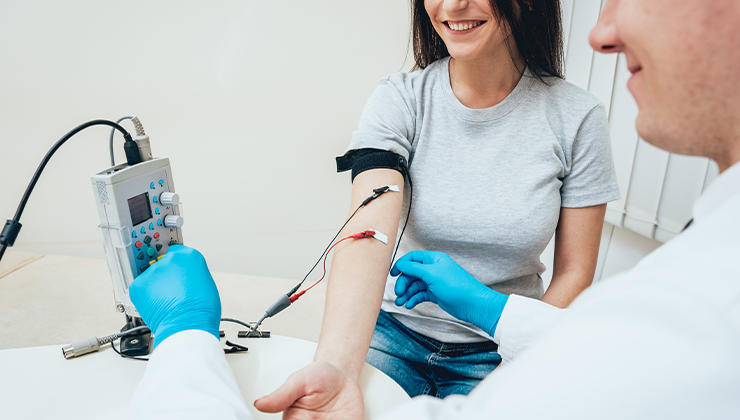Electromyography (EMG)
What to Expect During an EMG
Electrodiagnostic (EDX) medicine studies nerve and muscle diseases. To determine whether your nerves and muscles are working properly, your doctor may recommend an EDX test, which may include a nerve conduction study (NCS) and a needle electromyography (EMG). The results of the tests help your doctor diagnose your condition and determine the best course of treatment.
What are nerves and muscles?
Nerves work like electrical cords: They send signals to your brain and from your brain to your muscles. Muscles are tissues that make you move.
When working properly, the nerves send electrical impulses to the muscles. A nerve disorder means that signals are not getting through like they should. A muscle disorder means that muscles are not responding to the signals correctly.
Online Resources
Visit www.aanem.org/patients for more information on muscle and nerve disorders, to find an EDX specialist and a board certified doctor. There is also a video called “What to Expect During a Nerve Conduction Study and EMG Test” that provides good information.
How do I prepare for the test?
Tell the doctor if you take aspirin or blood thinners (like coumadin), have a pacemaker, or hemophilia. On the day of the test, take a bath or shower to remove oil from your skin. Do not use body lotion. If you have existing conditions, ask your doctor if you should take any medications before the test.
Why am I being send to the EDX laboratory?
You are being sent to the EDX laboratory because you may have numbness, tingling, pain, weakness, or muscle cramping. The doctor will use one or more EDX tests to determine if your muscles or nerves are damaged and, if so, how to treat you.
What will happen during the test?
There are usually 2 parts to the test:
- Needle EMG Testing
- Nerve Conduction Studies (NCSs)
Needle EMG Testing:
During the EMG test, the doctor inserts a small needle into several muscles to hear and see how your muscles and nerves are working. Electrical signals travel from the needle to the EMG machine. The doctor then determines the cause of your symptoms. We only test the muscles in question.
We use a new needle for each patient. You may experience a small amount of discomfort during the study.
NCS Testing:
The doctor or technologist applies small electrical shocks to your nerve(s) to study how the nerve works. These shocks cause a quick, mild, tingling feeling. The doctor or technologist may test several nerves.

How long does the test take?
The length of the test is different for every patient since each study is designed especially for your symptoms. The tests usually take 30 to 60 minutes. You may perform normal activities like eating, driving, and exercising before and after the tests. There are no lasting side effects.
When will I know the test results?
The doctor will discuss your test results with you or send them to your referring doctor. After the examination, you can check with the doctor who sent you to the EDX laboratory for the next step.
Who will perform my EDX testing?
The American Association of Neuromuscular & Electrodiagnostic Medicine (AANEM) recommends a medical doctor (MD or DO), board certified in neurology or physical medicine and rehabilitation, to perform EDX testing. You have the right to ask if the EDX doctor is certified by the American Board of Psychiatry and Neurology or the American Board of Physical Medicine and Rehabilitation. While your EMG will be performed by a doctor, he or she may instruct a technologist to perform your NCS. The technologist should be supervised by the doctor.
AANEM recommends that you choose a doctor who has completed additional EDX training, which teaches doctors how to diagnose nerve and muscle disorders. The American Board of Electrodiagnostic Medicine (ABEM) certifies doctors who have completed extensive EDX training. For a list of AANEM members, ABEM certified doctors, and accredited laboratories, visit www.aanem.org/Patients/Find-a-Specialist.
Contact Us:
Please call 239-349-3182 to schedule your appointment or 239-343-9290 for questions.
-
Lee Health Neurology
-
Neurodiagnostics - Riverwalk
